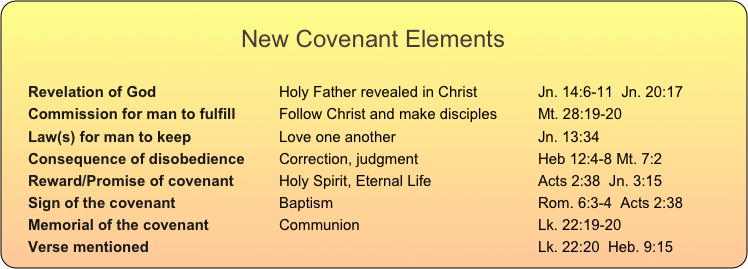Covenant Elements in the Lord’s Prayer


When Jesus' disciples asked him how to pray, he responded with what is commonly known as the Lord's Prayer. As the most repeated prayer in Christendom, it been examined from different perspectives, attempting to classify its basic concepts and arrangement. Perhaps the view that makes the most sense is that Jesus was teaching his followers about living according to the principles of the New Covenant, the basics of our “rights and responsibilities” as citizens of the kingdom of God. An examination of the elements of the New Covenant are reproduced below. The elements of the Lord's Prayer, taken from Mt. 6, NIV, illustrates the striking similarities between the two.
I. Revelation of God: "Our Father in heaven, hallowed be your name,"
Comment: Although the fatherhood of God was glimpsed by David and Isaiah, Jesus restored the Father-child relationship lost in Eden. This relationship with the Father is available to all who come to God through faith in Jesus Christ. God’s holiness, revealed in the Old Covenant, is maintained in the Fatherhood of God, requiring that his children approach him in reverence.
II. Commission: "Your kingdom come, your will be done on earth as it is in heaven."
Comment: This expresses both future and present reality. We are called to live according to kingdom principles, listening for the guiding voice of the Holy Spirit and walking in obedience to his revelation and leading. This is the essence of following Christ. This passage could also read: “your will be done by me...” Our lives and words are a witness not only of of the reality of the kingdom of God, but of the truth of our worship. Doing the Father's will is the true test of kingdom living: "For whoever does the will of my Father in heaven is my brother and sister and mother.” (Mt. 12:50)
III. Law: "Forgive us our debts as we also have forgiven our debtors,"
Comment: The commandment of the New Covenant is to “love one another as I have loved you.” The heart of this command is to accept and forgive others as we have been forgiven, for the disciple is to become like his Master. Without forgiveness, love cannot abide in our heart.
IV. Consequence: "Forgive us our debts as we also have forgiven our debtors,"
Comment: As Jesus explained after the Sermon on the Mount (Mt. 7:2), the measure we use to judge others is the same measure that will be used to judge us. We receive continued forgiveness for our sins only as we forgive those who offend us. Jesus made it clear that the two are inextricably linked in Mt. 6:15: “But if you do not forgive men their sins, your Father will not forgive your sins.” Holding a grudge or resentment, especially against a brother, places us outside the protections afforded by the New Covenant, opening us up to spiritual temptation and attack. If we do not repent of an unforgiving attitude toward our brother and sister in Christ, we will find ourselves coming under the Father’s discipline.
V. Reward: "Give us today our daily bread... and lead us not into temptation, but deliver us from the evil one."
Comment: As he has from the beginning, God takes care of the daily physical and spiritual needs of those in covenant relationship with him. He provides for the physical necessities of those who put the kingdom first in their lives: “But seek first his kingdom and his righteousness, and all these things will be given to you as well.” (Mt. 6:33) The protection of his Holy Spirit covers all who stand in faith against the temptations and persecutions of the evil one. (Jas. 4:7, Eph. 6:11) This protection will bring us safely through the trials and temptations of this life into our reward in the next.
VI. Sign:
Comment: No visible sign of the covenant is given in the Lord's Prayer. As Jesus stated, “The kingdom of God does not come visibly... because the kingdom of God is within you.” (Lk. 17:21) While baptism is the sign of our death to the world and our New Covenant life in Christ, the sign of the New Covenant to the world is the changed hearts and lives of Christ’s followers. “You show that you are a letter from Christ... written not with ink but with the Spirit of the living God, not on tablets of stone but on tablets of human hearts.” (2Cor. 3:3) As we abide by the principles of kingdom living, keeping God’s law and fulfilling the commission of the New Covenant, we become the sign of the New Covenant to those around us.
VII. Memorial: "Give us today our daily bread...
Comment: Jesus instituted the memorial of the New Covenant at the last supper, stating “This is my body, given for you. Do this in remembrance of me.” (Lk. 22:19) Although this is formally celebrated at the Communion service in remembrance of the Last Supper, the practice of thanksgiving for God’s provision is not limited to this. Giving thanks at mealtimes is a remembrance of God’s daily provision under the terms of the New Covenant.
Summary: The Lord’s Prayer is an acknowledgment that we are people of the New Covenant, members of the household of faith and citizens of the kingdom of God. To pray this prayer is to confirm our agreement and submission to the terms of the covenant that bind us to Jesus and our Father. It is also an affirmation of trust in Jesus’ provision and his promises - as his disciples in this life and heirs of eternal life.
Copyright 2011



